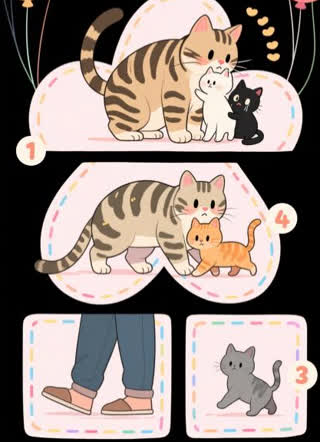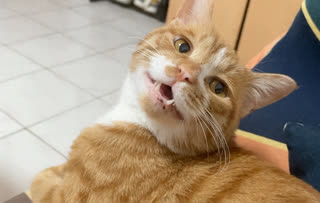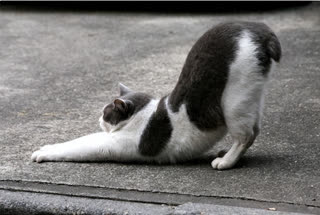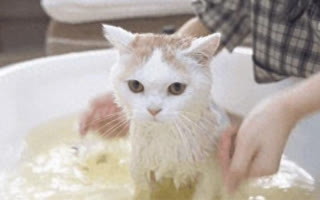The Abyssinian cat breed, known for its playful demeanor and striking ticked coat, is cherished by many as an intelligent and affectionate companion. However, even these spirited felines can fall victim to common health issues like colds. If you’re facing the challenge of caring for an Abyssinian cat with a cold, this comprehensive guide—"Cat Experience: What to Do If Abyssinian Cat Has a Cold"—will walk you through
Abyssinians are generally robust, but their active nature and curious tendencies may expose them to environments where respiratory infections thrive. Like all cats, they can contract viral or bacterial infections, such as feline herpesvirus (FHV-1) or calicivirus, which cause symptoms similar to human colds . However, their genetic predispositions—such as renal amyloidosis or pyruvate kinase deficiency—may weaken their immune systems, making them more susceptible to complications .
Recognizing early signs is critical. Common symptoms include:
Upper Respiratory Issues: Sneezing, nasal congestion, or discharge (clear, yellow, or green) .
Eye Problems: Redness, excessive tearing, or corneal ulcers (more common with herpesvirus) .
General Discomfort: Lethargy, loss of appetite, or fever (body temperature above 102.5°F) .
Behavioral Changes: Reduced activity, hiding, or refusal to interact—a stark contrast to their usual playful selves .
If your Abyssinian shows these signs, act promptly to prevent worsening.
To prevent spreading the infection to other pets, quarantine your Abyssinian in a quiet, warm room. Use separate food and water bowls, and disinfect surfaces daily with a 1:32 bleach solution .
Track changes in appetite, energy, and breathing. A sudden increase in respiratory effort or blue gums signals a medical emergency .
While mild colds may resolve in 7–10 days, severe cases require veterinary care. Your vet may recommend:
Antibiotics: For secondary bacterial infections (e.g., Bordetella or Chlamydophila) .
Antiviral Medications: If herpesvirus is suspected .
Fluid Therapy: To treat dehydration from reduced water intake .
Note: Never administer human cold medications, as they can be toxic to cats .
Steam therapy (e.g., sitting with your cat in a steamy bathroom) can ease congestion. Alternatively, use a humidifier to prevent dry air from irritating nasal passages .
Encourage water intake by offering warm chicken broth or wet food. If your cat refuses to drink, consult your vet about subcutaneous fluids .
Serve small, frequent meals of warm, palatable food (e.g., plain boiled chicken). Avoid forcing food, but seek veterinary help if your cat stops eating for 24 hours .
Wipe nasal and eye discharge with a damp cloth to prevent crusting. Trim fur around the face if needed .
While most colds resolve with home care, seek immediate help if your Abyssinian:
Struggles to Breathe: Rapid or labored breathing indicates pneumonia or severe congestion .
Has High Fever: A temperature above 104°F requires urgent attention .
Develops Neurological Symptoms: Seizures or disorientation may signal a systemic infection .
Core vaccines (e.g., FVRCP) protect against herpesvirus and calicivirus. Discuss booster schedules with your vet .
Abyssinians thrive on routine. Minimize changes to their environment and provide mental stimulation (e.g., puzzle toys) to support immune health .
Regularly clean litter boxes, food bowls, and bedding. Avoid contact with stray cats or sick animals .
Delaying Veterinary Care: Mild symptoms can escalate quickly, especially in kittens or cats with underlying health issues .
Overusing Antibiotics: Antibiotics only treat bacterial infections, not viruses. Misuse can lead to resistance .
Ignoring Environmental Risks: Cold drafts or damp conditions weaken the immune system. Keep your Abyssinian indoors during extreme weather .
Dr. Sarah Miller, a feline specialist, emphasizes: "Abyssinians’ active lifestyles mean they may hide symptoms longer than other breeds. Owners should monitor subtle changes, such as reduced jumping or grooming, which could indicate discomfort" .
Additionally, genetic testing for conditions like pyruvate kinase deficiency can help identify cats at higher risk of complications .
Caring for an Abyssinian cat with a cold requires vigilance, patience, and a proactive approach. By understanding their breed-specific vulnerabilities, recognizing symptoms early, and following these guidelines, you can help your feline friend recover safely. Remember to consult your veterinarian for personalized advice, and share this guide with fellow Abyssinian owners to spread awareness about "Cat Experience: What to Do If Abyssinian Cat Has a Cold".










